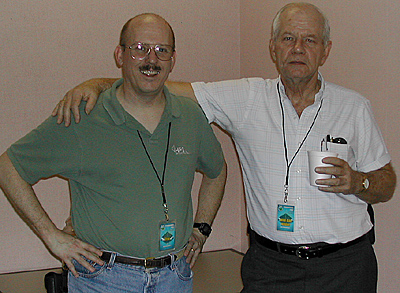 Connections exists to bring multiple minds together to figure out how to better prepare the Air Force in specific and armed services in general for the next war. By spending four days immersed in simulations, and introducing the military to the civilian sector, ideas and contacts can generate improved training and readiness.
Connections exists to bring multiple minds together to figure out how to better prepare the Air Force in specific and armed services in general for the next war. By spending four days immersed in simulations, and introducing the military to the civilian sector, ideas and contacts can generate improved training and readiness.
Left: Greg Smith and right: Bob McNamara
Part of this comes from lessons in the past. Part comes from contemporary situations. And part comes from future considerations. It's all structured in the lectures, but it also comes from mingling during break times, at meals, and during some of the scheduled but informal sessions like Demo Night.
Connections celebrated its 10th year in 2002 and it is interesting to see how ideas contemplated in prior years manifest themselves in the current year. It is invitation only, held at Maxwell Air Force Base in Montgomery, AL, and attendees are encouraged to stay on base. All of them do.
This year, I brought a digital camera to take some snap shots of the people I rubbed elbows with over the few days. These are not all of the folks at the conference, for I am sorry to report that I either forgot or just didn't have the camera with me on numerous occasions. You know the story...you get talking and time flies.
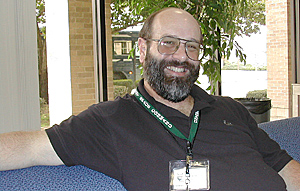
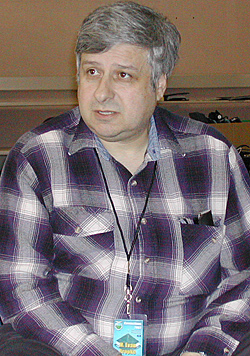 Icebreaker
Tuesday night is always reserved for the "icebreaker." This buffet style dinner allows folks to meet old friends and new acquaintances, swap stories and news, and generally put folks in a simulation mood.
Icebreaker
Tuesday night is always reserved for the "icebreaker." This buffet style dinner allows folks to meet old friends and new acquaintances, swap stories and news, and generally put folks in a simulation mood.
Left: Mike Crane, and Right: M. Evan Brooks
Sure, you can do all this via e-mail, but there's something special, spontaneous, and informative talking with people face-to-face.
Game Night
Wednesday night allows attendees to participate in one of the many games put on by companies. I played in the AIRGAP computer simulation. Others attended a lecture, others played in a pre-World War II political scenario, and still others played a multiplayer naval computer game. You certainly get enough to choose from, and a buffet dinner was served.
Working Group Session
Thursday late afternoon, the various working groups meet on the patio outside the Wargaming Institute for beer and pretzels. All attendees are invited, although I am quick to point out that these working groups were volunteer only, and I know the first rule of the military: never volunteer. Us "non-volunteers" ended up taking around the keg about everything from Hannibal crossing the Alps to modern Afghanistan air operations.
Demo Night
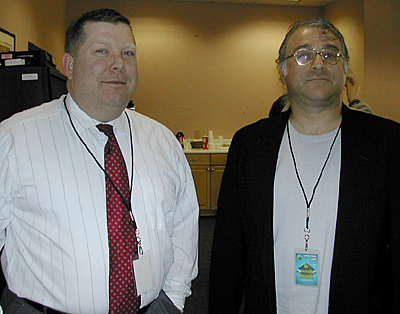 Thursday night is my working night, for MagWeb.com is demonstrated. Buffet dinner, aka the BBQ, was served. I answered questions, poked around some of the other companies areas before the 6pm kickoff, and managed to slip away to get dinner before they carted it away.
Thursday night is my working night, for MagWeb.com is demonstrated. Buffet dinner, aka the BBQ, was served. I answered questions, poked around some of the other companies areas before the 6pm kickoff, and managed to slip away to get dinner before they carted it away.
Left: Dr. Chris Cummins and right, Joseph Miranda, of Decision Games.
Library and Archive Tour
Friday was a group tour of the library and the USAF Archives (two separate buildings). We have use of both while we are there. I have in the past made use of the library, but it was on the tour, and I always had a question about the "vault."
The Archives was not much of a tour--they showed the computers you use to search records and the microfiche room with tapes and readers. If you need original documents, you fill out a form and one of the staff will go get the box. They noted that the WWII archives were restricted because they are starting to digitize everything. That was sad news--I was planning to search for some Operation Cobra air bombardment information. Note that the Archives were open 8am on Saturday morning, and I certainly vowed to come back the next day.
The Library tour showed us the computers to search for reference numbers and the stacks holding the books. I asked about references called "Vault." Our capable guide, Ron Fuller, explained that some materials were held in a vault and that you had to go to another section of the library to fill out a request for it. He also took us up to the Map Room, which houses contemporary maps, and after the tour, even led me to specific sections in the stacks that might be of interest.
Friday: Using the Library
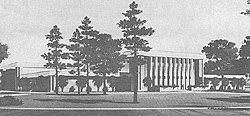 After the tour, I had about an hour before lunch, so I started to look up some information about Operation Cobra (breakout of Normandy, WWII), and found a paper in the vault. So I dutifully wrote down the information and filled out a form and presented it to the lady in the "cage." Evidently, there must be some high-level stuff inside, because she is literally in a wire enclosure with only a six-inch high by two-foot wide gap in the mesh to pass materials through. And yes, the materials are stored in a actual vault.
After the tour, I had about an hour before lunch, so I started to look up some information about Operation Cobra (breakout of Normandy, WWII), and found a paper in the vault. So I dutifully wrote down the information and filled out a form and presented it to the lady in the "cage." Evidently, there must be some high-level stuff inside, because she is literally in a wire enclosure with only a six-inch high by two-foot wide gap in the mesh to pass materials through. And yes, the materials are stored in a actual vault.
All was well, she found the booklet, and then asked me for my library card. I don't have one, but I do have the conference badge. Not good enough. But why give us a tour, allow us access, and say "if there's anything we can do for you while you're here..."
No good. You can't check it out without a library card. Ah, no problem, I don't want to check it out, I just want to read it for the information. "I'll sit right there," said I and pointed to a table not 10 feet away. No can do. You'll have to see the director for permission.
Hmmm. Now, in my mind, I was trying to fathom why the snafu. I mean, the USAF invited me, scrutinized me at the main gate, registered me for the conference, and gave me a badge. Yes, you do need a stinkin' badge here. I suppose she feared that I would walk, nay, run out the building with the unclassified Operation Cobra booklet, hop in my car, and be through base security checkpoint Charlie before being missed. I obviously had that gleam in my eye like your everyday information paper-jacker.
No, you can't fault her. I mean, they put her in a literal cage to safeguard materials which are literally kept in a vault. And the booklet on "close air operations" which included a chapter on Operation Cobra must be valuable enough to put in a vault.
So, off I went to the director (I think it was the asst. director), who directed me to another librarian, who happened to turn out to be Ron Fuller. He certainly remembered me, and so sent me back to the asst. director, who walked back with me to the cage and allowed me to attain the report and read it at the table.
Well, that was A-OK with me. I only wish I had access to a photocopier for a page or two, but since the photocopiers were across the hall back in the library, that would take me away from the cage, and thus bring down a platoon of MPs. How do I know? Another attendee asked for copier access. I knew better than to ask. When the asst. director mentioned the word "problem" in the same sentence as my request, I knew even getting access to the material would be problematical. I did, helpfully, note that I should be thought of as less a "problem" than a "challenge."
Anyhow, I'd like to report that all's well that ends well. And the information was especially informative, even hand copying it.
Now, if you think I'm sour, I'm not. I have a fond spot in my heart for librarians. This may not mean much to you, but back in 1988 (presented at the convention in 1989 as I recall), I won an award from the Special Libraries Association for an article I wrote for Personal Computing Magazine on corporate librarians who searched for information using on-line databases. A friend of ours is a librarian for a small college and sent me the SLA newsletter with my picture.
Friday Night Pub
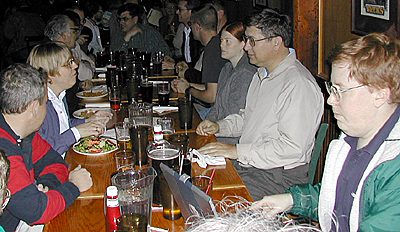 The Montgomery Brew Pub in downtown Montgomery seems the only thing open in the city after dark. It is a tradition for Connections attendees who stick around until Saturday to head down to the pub for a brew and dinner. I was staying until Saturday so I could partake of the Archive, and so went on the expedition.
The Montgomery Brew Pub in downtown Montgomery seems the only thing open in the city after dark. It is a tradition for Connections attendees who stick around until Saturday to head down to the pub for a brew and dinner. I was staying until Saturday so I could partake of the Archive, and so went on the expedition.
From right, counterclockwise: Scott Udell (looking at computer), Matt Caffrey (tan jacket), unknown (sorry), Capt. unknown (head turned away, van driver, double sorry), John Gresham (ear showing), Dr. Stephen Downes-Martin (glasses, white shirt), Larry Bond (foot of table), couple more unknowns (couple more sorrys), Dr. Martin Campion (grey hair, glasses), Mrs. Caffrey (blue sweater), Wing Cmdr Steve Dean (red and blue striped shirt).
Last year, we carpooled and everybody eventually found their way to the pub. This year, thanks to the increased security on base, Connections supplied a van and driver. The Pub is quite large: think half a supermarket size, not your traditional convenience-store sized pub. It is also quite crowded on a Friday night. Waiting for a table large enough to accommodate 15 people takes a while. Reservations? We don't need no stinkin reservations.
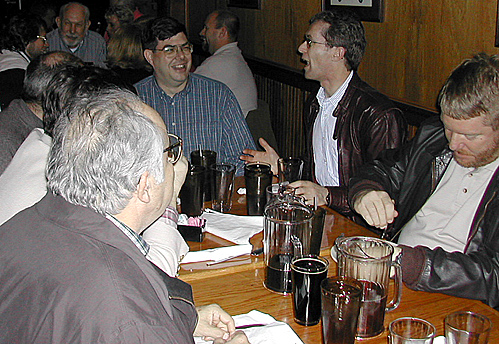 Anyway, the trip from base to city was filled with the comfortable banter of military and history buffs, in part because we didn't have to drive and figure out how to get to the pub, and in part because we were glassy-eyed even thinking about "pint of bitter" (well, maybe not bitter).
Anyway, the trip from base to city was filled with the comfortable banter of military and history buffs, in part because we didn't have to drive and figure out how to get to the pub, and in part because we were glassy-eyed even thinking about "pint of bitter" (well, maybe not bitter).
From right, clockwise: John Gresham (spearing something), Stephen Downes-Martin (white shirt), Larry Bond (blue shirt), unknown, John (dang, forgot his his last name), and Martin Campion (grey hair, glasses).
I can't remember all the jokes, bon mots, and other witticisms that punctuated the conversation--only mine--but I do remember the laughter and camraderie. Some of this is in the "you had to be there" mode, so forgive me if I relate an incident or two.
One fellow with an English accent, Downes-Martin, who is now an American citizen teaching at the US Naval War College, was remarking on the paucity of seating we could expect, and offered to provide us a quick seating by repeating some of his lectures when we entered, no doubt overaweing the hostess into rapture (or boredom). Now, this fine altruistic gentlemen had, during the course of his own conference lecture the day before, completely forgotten his train of thought in the middle of his lecture. So when he made his offer, I piped in, "That's only if you remember your lecture."
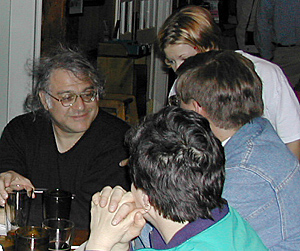 At another point, this same fellow was pointing out the difference between British and American slang in humor, and came up with the following knee-slapping "British" joke. I believe I'm telling this right:
At another point, this same fellow was pointing out the difference between British and American slang in humor, and came up with the following knee-slapping "British" joke. I believe I'm telling this right:
- "Why do elephants have big ears?"
"Because Noddy couldn't afford the tuck."
Well, that was a conversation stopper, with us 'Mericans scratchin' our pointy heads trying to figure this one out. No use. No explanations needed, either, thank you.
Right, clockwise: unknown (sorry), David Ross, our server for the evening (name unknown), and Joe Miranda.
At another point, we were talking about a swirl of Eastern Europe, NATO, and defense, when one of the authors in the group falls flat with an attempted bon mot, "Well, England's in Eastern Europe, isn't it?"
I chimed in with, "The only people who think that are you and Gerald Ford." Rewarded with a chuckle at the somewhat stretched analogy, I finished off with, "You must be watching too much of the East Enders." That got a chuckle, too.
Imagine that! A van full of sober folks with enough knowledge to pull out moldy tidbits of information from debate misfires and PBS shows. And this is just a snapshot of the type of back-and-forth that occured on the trip there and back.
In any case, the Pub was crowded, we did have to wait for a table, then there was a shuffling of tables, and a table that was taken back, and after all that, we finally got everybody seated, drinking, and eating.
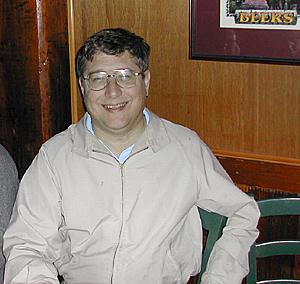 It was a special day for the conference coordinator, Matt Caffrey (at right), who celebrated a birthday and found out his high placing on the Colonel's promotion list. I know the number because Matt told me, but I'm not saying--ask him. I'm not sure exactly what tests and accomplishments factor into the list, but Matt's done a wonderful job on the conference over the years and presumably carries forth the same passion and dedication to his rest-of-the-year work.
It was a special day for the conference coordinator, Matt Caffrey (at right), who celebrated a birthday and found out his high placing on the Colonel's promotion list. I know the number because Matt told me, but I'm not saying--ask him. I'm not sure exactly what tests and accomplishments factor into the list, but Matt's done a wonderful job on the conference over the years and presumably carries forth the same passion and dedication to his rest-of-the-year work.
In asking about lists, we talked about percentages of making the next grade. Please don't quote me on any of these percentages because I am doing this from memory of a conversation in a noisy pub after a couple drinks. Any errors are mine and mine alone.
Basically, a Lieutenant has to be inept or a criminal not to make Captain--over 90% promotion rating. There's a lot of turnover as people finish out their four or five year mandatory service from various officer training programs and then elect not to re-up.
From Captain to Major, the odds are still with you, but the cut from Major to Lt. Colonel brings you down to a 50-50 level or so. Lt. Colonel to Colonel reaches an even steeper cut down around 20% or so. And Colonel to General is a whopping 3%. If you can make the last cut, your chances of promoting through the various levels of general rank improve slightly.
One of the points I would make is that any large pyramidal organization--in private, public, or military sectors--requires culling to move up the ladder. It may or may not be fair. It may or may not bleed experience in favor of new blood as officers can only serve a certain period of time in a particular rank. I'd say "Promotion or Perish" is kind of like a military form of academia's "Publish or Perish." In any case, from the point of view of a guy who attends one Matt conference a year, and listens to him speak perhaps at one other conference a year, I am pleased that he placed high on the list and hopefully, will continue his career shaping the war simulation curriculum at the USAF's Air University.
Attendee Biographies
Here are short bios of some of the folks in the photos. Those that lectured have their bios in my lecture write-ups.
Larry Bond Writer and Wargame Designer.
Mr. M. Evan Brooks - Author, Editor, Reviewer, and Attorney Mr. Brooks is a prolific writer of software reviews and is the former wargames editor for Computer Gaming World. In addition, he has written for PROCEEDINGS, AIR FORCE/ ARMY/ NAVY TIMES, PAPER WARS and numerous other publications. He maintains a web site, which is a comprehensive guide to all published computer wargames. Mr. Brooks served in the Kuwaiti Task Force during OPERATION DESERT SHIELD/STORM and is a retired lieutenant colonel in the Army Reserve. His first book, MILITARY'S HISTORY MOST WANTED, a compendium of various best and worst military categories throughout history, will be published by Brassey's in April 2002.
Mr. Matthew Caffrey Jr. - Lt. Col. USAFR; Author, Educator, Designer, Developer, Theorist Mr. Caffrey is the Professor of Wargaming at the Air Command and Staff College and a colonel select in the Air Force Reserve serving with the Air Staff's CHECKMATE office. Matt is the co-author of the Gulf War Fact Book, and the designer of the Joint Deployment/Employment Exercise (JDEX) and the Joint Resource Allocation Exercise (JRAX). He is the creator of the "Caffrey Cycle" theory of doctoral development and the concept of 3d Generation Wargaming. He frequently speaks on the history of wargaming and has written an Aerospace Power Journal article and a chapter on the subject. He is the founder of Air University's Connections conferences.
Mike Crane US Air Aforce Academy, Dep. Dir. of Assessment, HQAFA/DFE
Dr. Christopher Cummins - Publisher, Decision Games
Mr. John Gresham - Researcher, Author, Scenario Designer Mr. Gresham is the lead researcher for Tom Clancy, and is a key member of the team that put together Mr. Clancy's series of non-fiction books on elements of America's armed forces. Mr. Gresham also designed, researched and developed scenarios for the Harpoon game system.
Mr. Robert McNamara - BreakAway Games, Ltd. - Producer/Designer. Bob is an industry veteran with over 30 years of gaming experience and a large number of award-winning wargames to his credit. Getting his start at Avalon Hill, he was a major contributor to the Squad Leader series, being named Most Valuable Playtester for Cross of Iron and GI: Anvil of Victory. He also codesigned the Advanced Squad Leader system, and designed and/or helped develop nearly every ASL game module. He then moved on to TalonSoft where he was instrumental in the production of the Battleground series (Ardennes, Bulge, Gettysburg, Antietam, Shiloh, Bull Run, Waterloo and Napoleon in Russia), Age of Sail, the Campaign series (East Front, West Front and Rising Sun), and The Operational Art of War, Vol. 1. Now at BreakAway Games, Ltd., he is involved with the design and development of the Integrated Gaming System for Booz Allen & Hamilton and the US Army; and was the producer for Paradise Island, the expansion pack for PopTop Software's hit PC game Tropico.
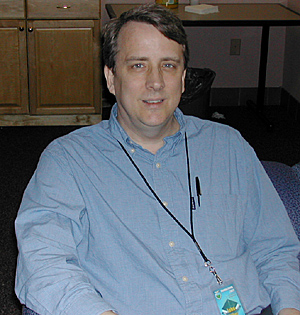 At right: John Tiller
At right: John Tiller
Mr. Joseph A. Miranda - Wargame Designer, Author, and Editor Mr. Miranda is a prolific designer of wargames and simulations and is the current editor-in-chief of Strategy & Tactics, the leading wargaming magazine. He is the Vice President for Design of Hexagon Interactive, a computer simulations design company. Mr. Miranda has designed circa 100 military simulations. He is the designer of CRISIS XXI, a DARPA simulation of terrorism, and CYBERWAR XXI, a computer simulation of modem operational level conflict. Mr. Miranda is a former Army officer and specializes in unconventional conflict. He has taught terrorism counteraction at the U.S. Army JFK Special Warfare Center.
Mr. Greg Smith - (Ret. Army), HPS Simulations, Game Designer
Mr. John Tiller - Independent Game Developer since 1995. To date, has done 20 wargames for Talonsoft, 14 for HPS Simulations, and 3 on-line for PBS and Military.com. His games have recorded Wargame of the Year four times, including Battleground Shiloh and Bulge '44. The Battleground series has been inducted into the Computer Gaming World Hall of Fame. Squad Battles: Vietnam received Editor's Choice from PC Gamer. He holds a PhD in mathematics from McMaster Univ. in Hamiliton, Ontario.
Mr. Scott Udell - Northrop Grumman Information Technologies - Software Development Scott, formerly the Associate Editor for Strategy & Wargames at Computer Games Magazine (a.k.a Strategy Plus), now does software development for Northrop Grumman Information Technologies on the ARCHER AAR system (used by the Army's Battle Command Training Program). He still writes freelance for CGM, and has started a column with MilitaryGamerOnline.com. He's long been personally and professionally interested in the use of wargames for training and education, so is particularly pleased to be making it to this year's Connections.
More Connections 2002
- Welcome and Introduction
Flight and Airport Security
Lecture: Gulf War: Perpectives and Prospects 10 Years Later (Col. John A. Warden III)
Lecture: Lessons from an Expeditionary Air Campaign: North Africa 1942-3 (John Hill)
Lecture: Air Command and Staff College (Lt. Col. Scott Lewis)
AIRGAP: Aerospace Basic Course Wargame (Capt. Scott Neiper)
Lecture: Air War College (Dr. Michael Hickok)
Lecture: Stalin's Dilemma (Dr. Ed Bever)
Lecture: National Defense University (Dr. Lee Blank)
Lecture: Military History and Wargaming (Martin Campion)
Lecture: Wargaming at SAMS School of Advanced Military Studies (Dr. William J. Gregor)
Lecture: Educating Campaign Strategists: UK Joint Services Command and Staff College (Wing Commander Steve Dean)
Lecture: US Air Force Academy Wargaming (Maj. Rick White)
Lecture: Building the Foundation of Military Simulations: US Naval Academy (Lt. Andrew Biehn)
Mingling: Making Connections
Saturday: Using The USAF Archives
Back to List of Conventions
Back to Travel Master List
Back to MagWeb Master List of Magazines
© Copyright 2002 by Coalition Web, Inc.
This article appears in MagWeb (Magazine Web) on the Internet World Wide Web.
Other military history articles and gaming articles are available at http://www.magweb.com